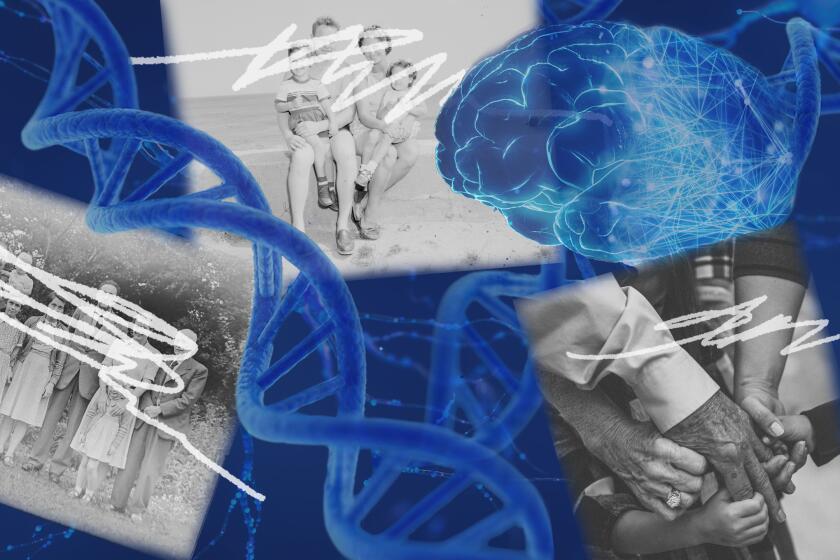Op-Ed: The next hospital crisis is coming. Let’s hope the U.S. is prepared

- Share via
The COVID-19 pandemic revealed devastating cracks in the foundation of U.S. healthcare. Hospitals were unprepared for enormous challenges to staffing, resulting from burnout and absences caused by the medical and psychological costs of the coronavirus.
There is another emerging crisis that could catch us again unprepared and last for decades: hospital emergencies stemming from dementia.
As the baby boomer population ages, more Americans will need hospitalizations and suffer from dementia. An estimated 1 in 3 seniors die with the condition.
Cars are a handy way to travel with people who have dementia. But finding a couple-friendly toilet on the road? That’s another challenge.
Older patients, particularly those with dementia, can become very confused and agitated when critically ill. They may sometimes act in ways that risk immediate harm to themselves or others, called a “behavioral emergency” in hospital medicine. Unlike security threats, this conduct typically lacks criminal intent and is caused by serious disease and dementia.
Nonetheless, these kinds of hospital emergencies are generally perceived as “violence” and countered with security force, the same response given to intentional, nonmedical safety threats. This often results in elderly patients being physically restrained while hospitalized. Restraints disrupt and decrease the quality and efficiency of their care — contributing to a financial drain on hospital systems and rising insurance premiums by clogging hospital beds and resources, and hastening provider burnout.
Hospitals already have medical rapid response teams: clinical specialists from multiple fields who are trained to respond together to medical crises, including heart attacks, strokes and lung failures. But shockingly, most hospitals nationwide do not have an emergency protocol to treat behavioral emergencies — whether from psychiatric illness, dementia agitation or medical disorientation — any differently than they would confront security threats. Instead of having access to psychiatric equivalents of medical rapid response teams, most care providers can only respond to behavioral emergencies by seeking security assistance.
The lack of progress in developing an effective Alzheimer’s drug that will treat the disease once it arises suggests that we’ve been looking at this problem in the wrong way.
That means calling in uniformed police and security specialists to suppress an agitated patient, who may be having a medical or dementia-related episode. Security-only responses do not provide clinical specialists to treat the medical causes of patient confusion and distress, including dementia. Uniformed officers can also trigger more fear in patients.
Yet there are well-researched, patient-centered protocols for handling behavioral emergencies. These approaches are just not prioritized in the United States.
Psychiatric equivalents to medical rapid response teams, frequently called behavioral emergency response teams, or BERTs, prioritize patient-centered care and provider safety by immediately mobilizing a team of specialists. Their first step is minimizing patient and provider injury through de-escalation. Hospitals might use psychiatric specialists if they have them available, but many successful BERT models de-escalate with non-psychiatric nurses, social workers, chaplains and others, maximizing staffing options.
As patients become calmer, primary hospital teams begin the second step of investigating the medical reasons contributing to their distress. While security staff still accompany BERT calls, they take a backseat to the clinicians and often don’t interact with patients at all. And because these teams can be formed with existing resources and cross-trained staff, BERTs need not add costs to care.
The key here isn’t the exact BERT model used, but correctly perceiving behavioral emergencies as clinical opportunities for primary hospital teams to provide the care they are supposed to be delivering in the first place.
Pioneering hospitals across the country have operated their own BERTs for decades, and British Columbia started using psychiatric rapid response teams throughout the Canadian province more than 20 years ago. In the U.S., however, healthcare systems and providers tend to stigmatize behavioral emergencies as forms of violence, rather than recognizing them as medical situations that demand appropriate, ethical care for sick, vulnerable patients. At Yale New Haven Hospital, for instance, cognitive impairment such as dementia is a common diagnosis in behavioral emergency codes, evident in 73% of such cases from June 2017 to June 2018.
American hospitals should be preparing for the foreseeable challenges of dementia. We cannot entirely stop all the costs and consequences of this coming wave. But we can learn from our northern neighbors in British Columbia and hospitals around the country and adopt one essential solution for behavioral emergencies: response teams that respect and protect patients and healthcare providers.
Carmen Black is an assistant professor of psychiatry at Yale University.
More to Read
A cure for the common opinion
Get thought-provoking perspectives with our weekly newsletter.
You may occasionally receive promotional content from the Los Angeles Times.












